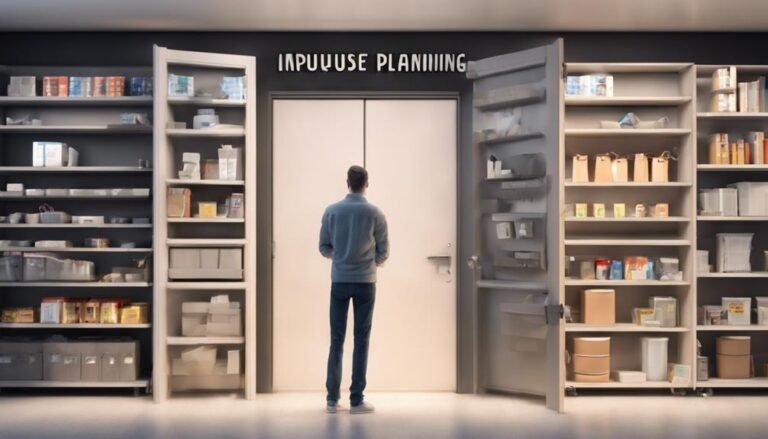Credit Card Debt: How to Avoid and Manage It
To avoid credit card debt, understand interest rates and consolidate debts for easier repayment. Create a budget by tracking expenses and setting spending limits aligned with your goals. Minimize credit card use to essentials and pay more than the minimum to reduce debt faster. Negotiate for lower interest rates and seek professional help for personalized advice. Be mindful of spending habits and consider balance transfer offers wisely. By implementing these strategies, you can effectively manage and prevent credit card debt. Additional insights on debt management and financial planning are available to further enhance your financial well-being.
Key Takeaways
- Track expenses, set limits, and create a realistic budget.
- Minimize credit card usage to essential purchases only.
- Pay more than the minimum amount due to reduce debt faster.
- Negotiate lower interest rates with creditors for savings.
- Seek professional help for personalized debt management strategies.
Understanding Credit Card Debt
To understand credit card debt, you must grasp the concept of borrowing money against a line of credit provided by a financial institution. When you make a purchase using a credit card, you're fundamentally borrowing money that you need to pay back later. If you don't pay the full balance by the due date, credit card interest will be applied to the remaining amount, increasing your debt.
Understanding how credit card interest works is vital to managing your debt effectively.
Debt consolidation is a strategy that can help you simplify your debt repayment process. It involves combining multiple debts into a single loan with a lower interest rate. By consolidating your credit card debt, you can streamline your payments and potentially save money on interest payments.
However, it's important to carefully consider the terms and conditions of a debt consolidation loan to make sure that it's the right choice for your financial situation.
Creating a Realistic Budget
To effectively manage your credit card debt, start by tracking your expenses accurately and setting clear spending limits.
By creating a realistic budget, you can make certain that you're aware of where your money is going and avoid unnecessary overspending.
Track Expenses Accurately
Accurately tracking your expenses is essential for creating a realistic budget that aligns with your financial goals. By diligently monitoring where your money goes, you can identify areas where you might be overspending and make necessary adjustments to stay within your budget.
Here are some budgeting tips to help you track your expenses effectively:
- Utilize Budgeting Apps: Take advantage of budgeting apps like Mint, YNAB (You Need a Budget), or PocketGuard to automatically track your expenses and categorize them. These apps provide insights into your spending habits and help you visualize where your money is going.
- Keep Receipts and Records: Save receipts from your purchases and maintain a record of your expenses. This hands-on approach allows you to see your spending patterns firsthand and aids in accurately tracking your financial transactions.
- Regularly Review and Adjust: Set aside time each week or month to review your expenses. Analyze where you can cut back or reallocate funds to align with your financial priorities and long-term objectives. Regular reviews help you stay on track with your budget and financial goals.
Set Clear Spending Limits
Setting clear spending limits is vital when creating a realistic budget that aligns with your financial objectives. By establishing budgeting boundaries, you give yourself a roadmap to follow and prevent overspending. Start by evaluating your income and fixed expenses to determine how much you can allocate towards variable costs like groceries, entertainment, and shopping.
Setting spending restrictions within each category can help you stay on track and avoid accumulating unnecessary credit card debt. Consider using budgeting tools or apps to monitor your expenses and make sure you're staying within your predetermined limits.
When setting spending limits, it's important to be realistic about your financial situation and avoid setting overly restrictive boundaries that may be difficult to adhere to. Flexibility is key, so allow for some leeway while maintaining discipline in your spending habits.
Regularly review your budget and adjust your spending limits as needed to reflect any changes in your income or expenses. By implementing clear spending limits and sticking to them, you can better manage your finances and reduce the risk of falling into credit card debt.
Minimizing Credit Card Usage
Consider limiting your credit card usage to essential purchases only to help minimize the risk of accumulating debt. This practice can assist in maintaining control over your finances and prevent unnecessary expenses.
When it comes to using credit cards wisely, here are three key strategies to help you minimize your credit card usage effectively:
- Use Cash Alternatives: Instead of relying solely on your credit card for all transactions, consider using cash, debit cards, or mobile payment apps. This can help you stay within your budget and avoid overspending.
- Set Clear Budgets: Establishing specific budgets for different categories of expenses can guide your spending habits and prevent impulse buying. By having a clear understanding of where your money should go, you can prioritize essential purchases over discretionary items.
- Monitor Your Spending: Regularly review your credit card statements to track your expenses and identify any patterns of excessive spending. Being mindful of your financial transactions can help you make informed decisions and curb unnecessary purchases.
Paying More Than the Minimum
To effectively manage your credit card debt, paying more than the minimum amount due each month is essential in reducing your overall balance and avoiding excessive interest charges. By utilizing the debt snowball method, where you focus on paying off the smallest debt first and then progressively tackle larger debts, you can gain momentum and see tangible progress.
Increasing payments beyond the minimum requirement accelerates your debt reduction process and saves you money on interest in the long run.
Automating payments is a convenient way to make sure you never miss a payment, thereby avoiding late fees and potential damage to your credit score. Setting up automatic payments for at least the minimum amount due guarantees that you stay current on your credit card bills.
Additionally, any extra payments you make above the minimum can further expedite your debt repayment journey.
Negotiating Lower Interest Rates
Reducing the interest rates on your credit cards can greatly decrease the total amount you pay over time and make it easier to manage your debt effectively. Negotiating lower interest rates is a proactive step towards financial stability.
Here are three essential tips to help you negotiate better terms with your credit card companies:
- Highlight Your Payment History: Emphasize your track record of timely payments and responsible credit card usage. This can demonstrate to the issuer that you're a reliable borrower, making them more inclined to lower your interest rate.
- Consider Debt Consolidation: If you have multiple credit cards with high-interest rates, consolidating your debt into a single lower-interest loan can save you money in the long run. Debt consolidation can simplify your payments and reduce the overall interest you pay.
- Explore Debt Settlement Options: In situations where you're struggling with overwhelming credit card debt, negotiating a debt settlement with your creditors can help lower the total amount owed. This can provide relief and a structured path towards becoming debt-free.
Seeking Professional Help
If you find yourself overwhelmed by credit card debt, seeking professional help can provide valuable guidance and support in managing your financial situation effectively. Debt counseling services offer personalized strategies to help you tackle your debts. These professionals can assist in creating a budget, negotiating with creditors, and developing a repayment plan tailored to your financial capabilities.
Credit counseling agencies specialize in providing advice on managing debt and improving financial literacy. They can offer insights on debt consolidation options, where multiple debts are combined into a single, more manageable payment. Debt consolidation may lower your overall interest rates, simplify your payments, and help you become debt-free sooner.
Financial planning services can also be beneficial in creating a roadmap for your financial future. Financial planners can help you set achievable goals, create a savings plan, and prioritize debt repayment.
Frequently Asked Questions
Can I Transfer My Credit Card Debt to Another Card?
Yes, you can transfer your credit card debt to another card through a balance transfer or consolidate it with a consolidation loan. Both options can help you manage debt more effectively and potentially lower interest rates.
What Happens if I Miss a Credit Card Payment?
If you miss a credit card payment, you may incur late fees and your credit score might be negatively impacted. It's essential to make timely payments to avoid these consequences and maintain a healthy financial standing.
Is It Possible to Settle Credit Card Debt for Less?
Yes, it is possible to settle credit card debt for less. Negotiation strategies can help you achieve this. Be cautious when involving debt settlement companies; research thoroughly to make sure they are reputable and will work in your best interest.
Will Closing a Credit Card Affect My Credit Score?
Closing a credit card can impact your credit score by reducing your available credit and potentially increasing your credit utilization ratio. Consider keeping the card open or explore alternative solutions to maintain a healthy credit profile.
Can I Use a Personal Loan to Pay off Credit Card Debt?
Yes, you can use a personal loan for debt consolidation to pay off credit card debt. It can simplify your payments and potentially offer a lower interest rate. Consider loan options carefully to manage your debt effectively.
Conclusion
In summary, managing credit card debt is essential for financial security.
Did you know that the average American household carries over $8,000 in credit card debt?
By creating a realistic budget, minimizing credit card usage, and paying more than the minimum, you can avoid falling into the debt trap.
Remember, seeking professional help is always an option if you find yourself struggling to manage your credit card debt.
Stay informed and proactive to keep your finances in check.








